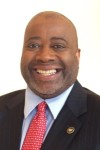Last week, civil rights leader and political icon Marion Barry died and barely after he had taken his last breath, the media was besmirching his reputation.
Barry was a “true” civil rights icon, not one “appointed” by the media. A “true” icon or leader should be like a candle; the more light he gives the less he becomes. The more light a candle gives out to lighten the darkness, the less it becomes; that is the essence of true leadership and Barry had plenty of that.
Barry was born in Itta Bena, Miss. but was reared in Memphis, Tenn. As a high school teen, Barry had a paper route and was promised a free trip to New Orleans if he obtained 15 new customers. Barry and several other Black teens achieved the 15 new customers goal, but was denied the trip to New Orleans because the city was segregated.
So Barry organized all the other Blacks with paper routes and they refused to work their routes until the newspaper delivered on their promised trip to New Orleans. They ended up receiving a free trip to St. Louis, my hometown because it was not a segregated city. This was the beginning of his fight against discrimination.
Barry graduated from LeMoyne College, now Lemoyne-Owen College, a historically Black college, in 1958 with a degree in chemistry. He went on to receive his M.S. in organic chemistry from Fisk University, another historically Black college. He was only a few credits away from receiving his Ph.D in chemistry from the University of Tennessee before dropping out to devote his attention full time to fight for civil rights for Blacks.
He eventually moved to Washington, D.C. where he served on the school board, four terms as mayor and three terms on the city council. His two signature accomplishments, by far, are his summer youth jobs program and mandating strict minority participation in all DC procurement opportunities.
His youth job program began in the summer of 1979 and was eventually expanded to be a year-round program. Under Barry, government contracting went from 3 percent to 47 percent of all procurement. He also hired professional Blacks to run various government agencies under his control. These actions were unprecedented in D.C. and have never been duplicated since, though every D.C. mayor has been Black.
So, by the time Barry was set up in a sting operation by the FBI smoking crack cocaine in 1990, he had established himself as a political powerhouse in D.C.; he had 20 years of being an advocate for good before he had his first negative blip as an elected official.
This is why I found the media’s behavior so offensive when, upon Barry’s death, they immediately began mentioning his arrest for smoking crack. Is it a legitimate part of Barry’s life’s narrative? Of course, but not in the immediate aftermath of his death. Could the media not allow his body to grow cold before they talked about his personal flaws?
Whenever the media interviewed or discussed Barry, they somehow seemed to always find a way to interject his crack arrest into the story. But somehow this same media never mentions former president Bill Clinton’s many dalliances with women when they interview him or discuss his legacy; they hardly mention his admitted sexual affair with a White House intern, Monica Lewinski.
How many of you are aware of 60 Minutes correspondent and CBS News chief foreign affairs reporter Lara Logan admitted to having sexual affairs with two American men simultaneously in Iraq that led to the two men getting into a fist fight over her (I guess she took her CBS News title literally). U.S. State Department contractor Joe Burkett and CNN correspondent Michael Ware fought a battle royale over Logan in a Baghdad safe house which put innocent people’s lives in jeopardy.
How many of you are aware that NBA broadcaster and TNT announcer Marv Albert was accused of raping at least two women and agreed to plead to lesser charges. He was suspended for two years, but his personal issues are rarely, if ever, mentioned.
I would just simply say, pull up a picture of each of these people and make your own conclusions.
Barry, without question, has created more Black millionaires in this area than all other people combined. Without Barry, there would be no Bob and Sheila Johnson, co-founders of BET, America’s first Black billionaires.
Without Barry, there would be no R. Donahue Peebles, head of Peebles Corporation, the largest Black-owned real-estate development company in America. At the age of 23, Barry appointed him to the Board of Equalization and Review, the real estate tax appeals board; at the age of 24, he was made chairman of the board, one of the most powerful boards in D.C.
To my dismay, even Black-oriented –but not Black owned – media outlets, including The Root (owned by the Washington Post) and The Grio (owned by NBC) have been no better than the White media’s portrayal of Barry.
To White folks who seemed to be confused by the love affair average Blacks had with Marion Barry and are always asking me why Blacks seem to almost worship him; to those with that question, I say for the same reason average Whites seem to almost worship Ronald Reagan.
For all of Barry’s personal demons, like a candle, he used himself up to lighten the path for others. That is why people called him “Mayor for Life.“
 Raynard Jackson is president & CEO of Raynard Jackson & Associates, LLC., a Washington, D.C.-based public relations/government affairs firm. He can be reached through his Web site, www.raynardjackson.com. You can also follow him on Twitter @raynard1223.
Raynard Jackson is president & CEO of Raynard Jackson & Associates, LLC., a Washington, D.C.-based public relations/government affairs firm. He can be reached through his Web site, www.raynardjackson.com. You can also follow him on Twitter @raynard1223.
– See more at: http://www.blackpressusa.com/2014/12/media-should-treat-marion-barry-like-it-treats-bill-clinton/#sthash.JcKBevxh.u29lxVL8.dpuf

























